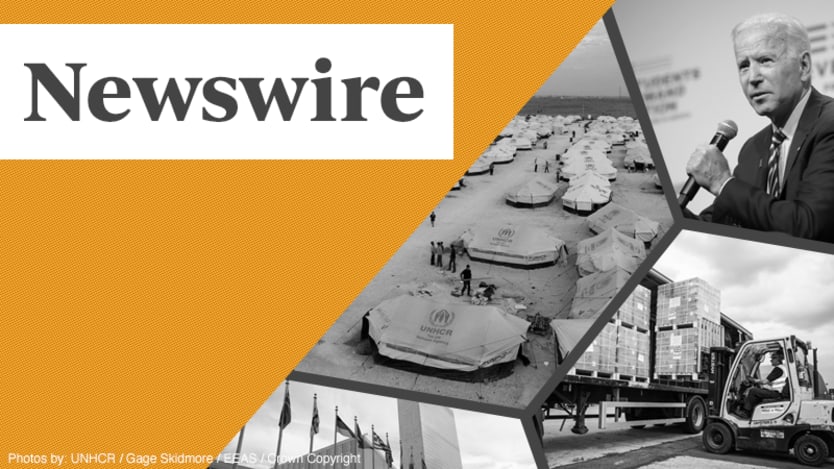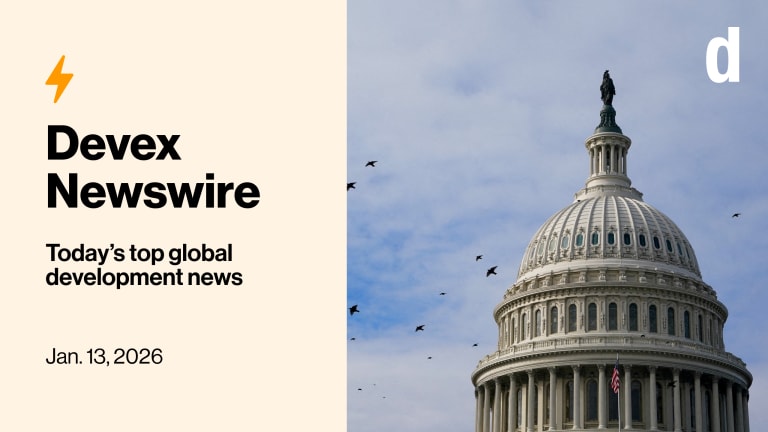
This is a preview of our daily Newswire. Sign up to this newsletter to receive an inside look at the biggest stories in global development.
Aid to Syria is the latest victim of U.K. budget cuts. The U.S. government’s contribution also came up short, while Germany picked up the slack.
Foreign Secretary Dominic Raab announced Tuesday that the U.K. would provide at least $281 million to the Syria crisis this year, marking a 32% drop from what the country pledged a year ago.
“If humanitarian aid is no longer a departmental priority, then the government should explain why. Taxpayers have a right to know where their money is going, and currently these decisions are subject to little or no scrutiny,” said Jean-Michel Grand of Action Against Hunger UK.
U.S. Ambassador to the United Nations Linda Thomas-Greenfield announced more than $596 million in U.S. humanitarian assistance — $100 million less than last year. Jan Egeland of the Norwegian Refugee Council called the two pledges “disappointing” at a time when “the international community has failed to exert its influence to stop Syria’s warring parties from using civilians as pawns on a chessboard.”
U.N. and its humanitarian allies are also fighting to extend the organization’s mandate to conduct cross-border relief operations into Syria, which is set to expire in July.
U.N. Secretary-General António Guterres told the U.N. General Assembly on Tuesday that failing to do so, “would end the United Nations COVID-19 vaccine distribution plans for millions of people in north-west Syria, and greatly diminish essential humanitarian operations.”
Will Worley reports on the steep funding cuts at the Supporting the Future of Syria and the Region conference.
Sponsored by Catapult: Q&A: Wildlife, the web, and the SDGs
How does conservation intersect with development, and what role can technology play in bolstering both? WILDLABS’ Stephanie O’Donnell explains.
FINE PRINT
China’s competitors often describe its approach to global development as “debt-trap diplomacy,” a model that saddles countries with unsustainable debt in order to gain geostrategic leverage over critical infrastructure.
While that has been a useful narrative, particularly for U.S. officials eager to show they are offering a more transparent alternative, the real picture looks more complicated. At least that’s what emerges from an unprecedented analysis of 100 Chinese loan contracts that a team of researchers managed to get their hands on, as Adva Saldinger reports. Here’s what they found:
There’s no smoking gun, says Anna Gelpern of Georgetown University. China’s lending institutions achieve “impressive bargaining power” by combining loan clauses that put it in a superior position to its borrowers.
“Chinese lenders behave a lot like commercial lenders: muscular, commercially savvy lenders who want to be paid on time and with interest,” says Bradley Parks of AidData.
Chinese creditors make regular use of nondisclosure agreements, which can put countries in an awkward position when other lenders demand information about their debt burdens.
Read Adva’s report on “the first systematic analysis of the legal terms of China’s foreign lending.”
WEAKEST LINK
The COVID-19 pandemic has revealed gaps in global health security architecture. International Health Regulations, meant to hold countries accountable for reporting on public health events, are meaningless if countries opt not to implement them.
On Tuesday, dozens of government leaders, the president of the European Council, and World Health Organization head Tedros Adhanom Ghebreyesus voiced support for a new international treaty for pandemic preparedness and response. Some hope it would help put more diplomatic power behind global health obligations. Though the U.S. and China didn’t sign on to the call for the treaty, Tedros described their response as “positive.”
Their support comes as 14 countries issued a joint statement of concern about WHO’s new report on the origins of the coronavirus.
Devex Pro: An interactive on the leading health security donors
CHANGE AGENTS
“We’re really trying to lean into shifting power to those who we fund.” — Don Gips, CEO at Skoll Foundation.
Catherine Cheney reports on the Skoll Foundation’s plan to connect “proximate grantmakers” with “decision-making frameworks.”
BAT KARMA
Bats are a likely culprit in the COVID-19 origin story — possibly passing the virus to another small mammal, which then spread it to humans. New research from the U.S. Geological Survey suggests it is unlikely that human researchers are at risk of giving the virus back to bats — at least during the North American winter.
IN THE NEWS
Three polio vaccination workers, all women, were shot dead by unidentified armed men in Afghanistan on Tuesday. [Reuters]
WTO chief Ngozi Okonjo-Iweala wants to convene various stakeholders in mid-April to address COVID-19 vaccine scarcity. [Reuters]
The Indian government has backtracked on its policy to "politely turn away" pro-democracy protesters fleeing the military crackdown in Myanmar. [BBC]
Sign up to Newswire for an inside look at the biggest stories in global development.








